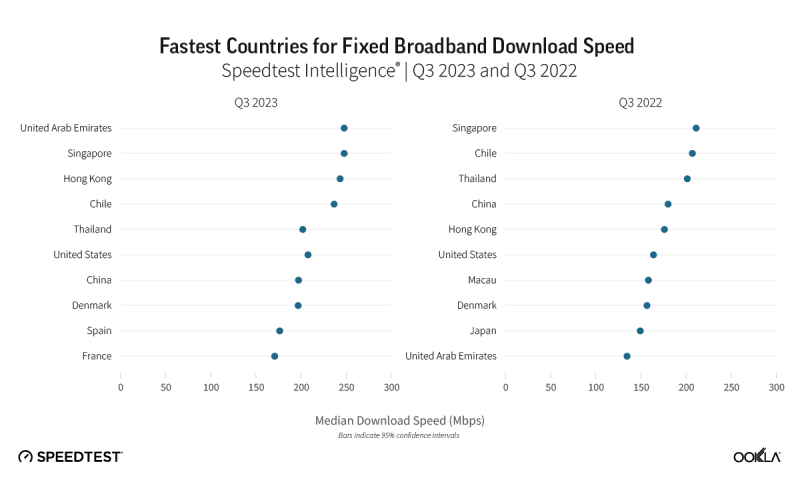New Ookla Speedtest Intelligence data shows fixed networks worldwide achieved a median download speed of 83.95 Mbps in the third quarter, marking a 19% increase from 70.3 Mbps in Q3 2022.
Global upload speeds saw a higher year on year improvement, rising 28% from 29.95 Mbps to 38.32 Mbps.
According to Ookla, the increase in both download and upload speeds is a result of more fixed networks migrating to fiber. However, the shift toward fiber-to-the-home varies across different countries.

Ookla ranked the countries with the fastest fixed download speeds, and the U.S. came in sixth place with a median download of slightly above 200 Mbps. That’s a 26% improvement from Q3 2022, Ookla’s data shows, and upload speeds improved by 7%.
Still, the U.S.’ ranking is unchanged from the prior year, whereas countries like the United Arab Emirates (UAE) and Singapore are leading the way in fixed network speeds.
Interestingly UAE, which Ookla said reached a median download speed 247.63 Mbps in Q3 2023, saw its download speeds nearly double since 2022. Ookla explained most customers in UAE have access to a fiber connection.
Also, operators in the country are taking “additional measures” to boost internet speeds, such as raising the minimum download speed from 250 Mbps to 500 Mbps and offering price discounts for customers that upgrade to higher-tier plans.
As for Singapore, which touted the second fastest median download speed, is one of a handful of countries that “achieved 100% FTTH coverage,” said Ookla. Aside from having a small land mass, Singapore also has regulation requiring building owners and real estate developers to provide “adequate space, facilities, and accessibility” for operators to pre-install fiber networks.
In the U.S., the current standard for fixed broadband speeds is 25 Mbps download and 3 Mbps upload, but the federal government is looking into changing that. The FCC in November released a Notice of Inquiry that proposed increasing the national benchmark to 100/20 Mbps.
100/20 is also the minimum speed for projects that will receive Broadband Equity, Access and Deployment (BEAD) funding.
Ookla said the FCC’s move is “in line with the demand for faster network performance in the market.” It described the U.S. as a “very competitive” broadband market, as technologies like fiber, cable and fixed wireless access are all “vying for customers.”